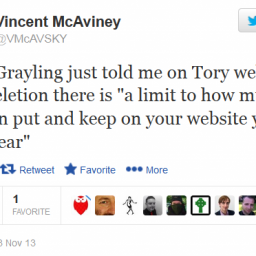I was poking around a webzine (do people still say that?) I used to read back in the day and decided to see if, after nearly a decade of existence, if it was paying its writers. here’s what I found, really low on its “Call for Submissions” page, in reduced font size:
Note: We are unable to pay you for your work at this time, but you will not go entirely uncompensated; your ‘pay’ is the opportunity to address our readership, currently 1 million-plus unique readers per month and counting.
We are supposedly in the Golden Age of the Startup, where college students and geeks with a bit of drive and a novel idea can potentially become multi-millionaires – or at least quit their day jobs – and writers are still, still writing for pageviews.
AOL’s purchase of Huffington Post was another swift kick in the gut for professional online writing, especially the unpaid bloggers who are now hoping for a piece of the AOL pie after years of creating content and bringing traffic to the site. As much as I sympathize with all of the writers who expected some compensation for all of their efforts – it’s deserved and long overdue – this battle was one that needed to be fought by professional writers years ago, when there was still something to leverage with then – fledgling websites, so hungry for content.
I’ve ranted about this before, back in 2009:
I don’t mean to single out HuffPo, that website is certainly not the sole offend
er when it comes to paying with pageviews. I don’t even think it’s the fault of the internet. I think it’s us, the scores of writers (myself included) who have devalued our own work over the years by doing professional-level work for free — or for far too little.
We write for exposure. We write for practice. We write for press passes. We write for beer/diaper/vacation money. We write for lulz. But we don’t write to support ourselves. And we end up screwing ourselves everytime.
Absolutely nothing about the above blog post has changed, save one crucial element: it’s worse now because content websites are now coming up with monetization strategies – advertisers are finally coming around to seeing the value of online – but many of these strategies are built around the idea that websites can always find someone to write for “exposure” or for WAY less than they are worth. Some can afford to do it because they have full-time jobs or spouses or side projects that pay their bills. Some writers have been able to use their free writing gigs to network and gain entry into paying gigs, but it’s still the exception rather than the rule. Writers for the most part are still waiting for online monetization of some of the bigger blogs/webzines to trickle down to content creators, and for the majority of writers that ship has sailed.
However, there is an opportunity for writers who are willing to hustle to create a career for themselves. I’ve seen it at blogger conferences like BlogHer and Blogalicious and if i ever get to BlogWorld, I’d probably see it there too: Writer/entrepreneurs creating self-contained careers out of the work they create.
I’m not saying this is easy or even that the individuals that choose to do it are making big bank, I don’t have the numbers. And it involves a LOT of hustle, a level of hustle (or “personal branding” if you prefer that term) that many of us who were attracted to writing in the first place may not be comfortable with. Some of these folks still write for free for some of the bigger websites, but they do it with a goal in mind, to build traffic and exposure for their own websites.
And it’s not all jellybeans and rainbows on the staff-level end of the online writing world either. Business Insider recently leaked a memo sent to AOL staff editors on the “AOL Way” of reporting and writing. Behold the future of reporting, AOL style:
From Business Insider:
AOL is using this document to train editors right now. It is an illuminating look into how AOL, a company with hundreds of millions in dollars in annual funding, is trying to turn itself into a 21st century media giant on the fly.
- AOL tells its editors to decide what topics to cover based on four considerations: traffic potential, revenue potential, edit quality and turn-around time.
- AOL asks its editors to decide whether to produce content based on “the profitability consideration.”
- The documents reveal that AOL is, when the story calls for it, willing to boost traffic by 5 to 10% with search ads and other “paid media.”
- AOL site leaders are expected to have eight ideas for packages that could generate at least $1 million in revenue on hand at all times.
- In-house AOL staffers are expected to write five to 10 stories per day.
- AOL knows its sites are too dependent on traffic from AOL.com, and it wants its editors to fix the problem by posting more frequently, with more emphasis on getting pageviews.
So in short, this is the reality of professional (or semi-professional) online writing now: writing for pageviews for free or hustling like mad to build a following , or for a company – essentially still writing for pageviews. I think the choices will be different for everyone who chooses to stay in this field. Not everyone wants to be an entrepreneur, and that shouldn’t have to be the only way to stay in the field. Either way, I think any writer holding out for the charity of Huffiington Post/AOL – or any of the content farms, should look at other strategies to build a career. The model has now been established.





Jebus that’s depressing.
Quote: “(..) devalued our own work over the years by doing professional-level work for free – or for far too little.”
Hmm – that makes Writers sound a little too much like Harlan Ellison:
“I don’t take a piss without getting paid for it.” Thanks, Harlan.
Talk about the open, sharing spirit of artistic creativity..
Harlan: “I sell my soul.. at the highest rates.”
The reason I still maintain a blog is to get laid every night by geeky cyborg women with short hair into Cyberpunk sci-fi and ultraviolent online multiplayer shooters.
..Of course, the other reason to write (in fact the only way to write nowadays) is to stop thinking about your miserable Self for 2.4 seconds – and use literature to change the very nature of Reality..
– Henry Swanson
Writing for the art is fine if you are a) independently wealthy, b) independently wealthy or c) independently wealthy. When writing involves legwork, research, interviews with real humans? That shit *costs* money. To not be paid for it is not acceptable.